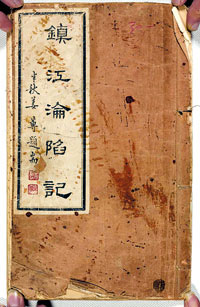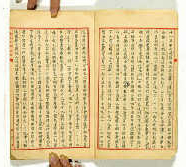|

Manuscripts of "The Fall of Zhenjiang", by Zhang Yibo (1884-1964), will be put under the hammer in the capital by auction house Beijing Council International Auction Co Ltd, on December 1.
|
Five days before they carried out the Rape of Nanking in December 1937, Japanese invaders captured the neighboring city of Zhenjiang.
The attackers of the then provincial capital of Jiangsu failed to notice one of the city's resident's recording, right under their noses, the atrocities they inflicted on civilians every day for more than two months.
What the Japanese did then is finally coming to light.
Manuscripts of "The Fall of Zhenjiang", by Zhang Yibo (1884-1964), will be put under the hammer in the capital by auction house Beijing Council International Auction Co Ltd, on Dec. 1.
The Hong Kong owner of the manuscripts has set a reserve price of just 20,000 yuan (15,400 U.S. dollars) - the amount he paid for them - in the hope a public library or museum will acquire the piece of history.
"The owner contacted a few public institutions several years ago but came up against red tape," Dong Guoqiang, president of the auction house, said.
"The manuscripts are so important they should be owned by people who will carry out research on them and make full use of their historical value."
The author of the manuscripts, Zhang, joined the Revolution of 1911 which toppled the Qing Dynasty (1644-1911).
He returned to his hometown of Zhenjiang afterwards and built a textile factory there.
When the Japanese invaders captured Zhenjiang on Dec. 8, 1937, he chose to stay with his factory, but was forced to flee with family members more than two months later, never to return.
Zhang spent his final months in the city documenting the barbaric acts he saw being committed by the Japanese.
The manuscripts contain 124,000 characters in nine chapters. The work covers the political and economic scene of the city before its fall, and the day the Japanese arrived.
Zhang also wrote about how Zhenjiang residents became forced labor for the Japanese, as well as his own thoughts on the war and what he heard about his city after he left.
Included in the work are the diaries of Dejun, a monk at the Dinghui Temple in the Jiaoshan Hill in Zhenjiang, and an American expatriate's article on the Nanjing Massacre, which was written in 1938.
(China Daily November 21, 2007)



